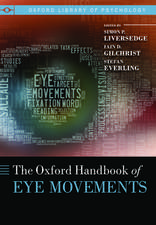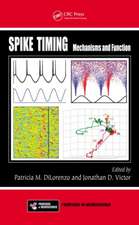Neurosciences and Ethics: Klostergut Jakobsberg, 20.–25. April 1986 Federal Republic of Germany
Editat de Benno Hess Uwe Opolka Editat de Detlev Ploogen Limba Engleză Paperback – 6 apr 1988
Preț: 638.24 lei
Preț vechi: 750.88 lei
-15% Nou
Puncte Express: 957
Preț estimativ în valută:
122.13€ • 130.60$ • 101.83£
122.13€ • 130.60$ • 101.83£
Carte tipărită la comandă
Livrare economică 18 aprilie-02 mai
Preluare comenzi: 021 569.72.76
Specificații
ISBN-13: 9783540191346
ISBN-10: 3540191348
Pagini: 220
Ilustrații: XII, 248 p.
Dimensiuni: 170 x 244 x 12 mm
Greutate: 0.36 kg
Editura: Springer Berlin, Heidelberg
Colecția Springer
Locul publicării:Berlin, Heidelberg, Germany
ISBN-10: 3540191348
Pagini: 220
Ilustrații: XII, 248 p.
Dimensiuni: 170 x 244 x 12 mm
Greutate: 0.36 kg
Editura: Springer Berlin, Heidelberg
Colecția Springer
Locul publicării:Berlin, Heidelberg, Germany
Public țintă
ResearchDescriere
The human brain occupies a unique position among the organs of the human body. With its 1010 nerve cells and the innumerable interconnections, it is the most complex living system we know. It is the prerequisite for all though~, feeling, and action and hence for the awareness of ourselves. In many religions and philosophies it was and is considered to be the seat of the immortal soul. For centuries some individuals looked upon the mentally ill with holy reverence, and others responded with shock and radical social ostracism. In the neurosciences, too, the brain is not just one organ among many. As with the genome, it is considered to be an information storage unit. But whereas the genetic information cannot be influenced by the individual carrier, the brain can learn; that is, it is capable of storing information from the life history of its carrier, and it can pass this information on. The neurosciences are an area of research that has cut across the boundaries of the classic disciplines and now includes a broad spectrum ranging from basic research to clinical medicine. These sciences have developed remarkable momentum since they have taken an interdisciplinary approach and made use of experimental techniques and concepts developed in the fields of physics, biochemistry, molecular biology, behavioral physiology, experimental psychology, and computer science.
Cuprins
Opening Address.- Opening Speech.- Basic Research in the Neurosciences.- Session I.- Molecular Biology of Neural Signaling — Structure and Function of Ionic Channels.- Discussion.- Session II.- Principles of Neural Network Construction.- Discussion.- Session III.- New Insights About Chemical Transmission in the Brain.- Discussion.- Session IV.- Huntington’s Disease: An Example of Advances in Genetics Posing Ethical Problems.- Discussion.- Clinical Neurosciences.- Session V.- Intensive Care, Vegetative State, and Brain Death.- Discussion.- Session VI.- Functional Neurosurgery and Psychiatric Neurosurgery.- Discussion.- Mental Health.- Session VII.- Epidemiology of Depression.- Epidemiology of Depression, Alcohol and Drug Abuse.- Discussion.- Session VIII.- Clinical Psychopharmacology: Research and Development.- Discussion.- Session IX.- The Current State of Research in Psychiatry: Ethical Analysis of the Patient-Doctor Relationship.- Discussion.- Neurosciences and Ethics.- Session X.- The Ethical Issue in Research and Treatment of Neurological and Mental Disorders.- Discussion.- Final Document. Proposals Made by the Delegates at the End of the Conference.- Delegates.















